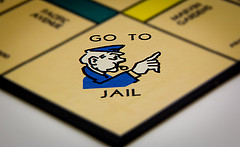Civil Lawsuits and the Automatic Stay
The automatic stay goes into effect when you file for bankruptcy and prevents creditors from pursuing action against your property in an attempt to collect debts. It also stops all civil lawsuits involving the debtor. Any action against a debtor brought after he files for bankruptcy violates the automatic stay. If a debtor is incarcerated before filing for bankruptcy, does the automatic stay compel his release?
Struggling With Child Support…
The story of In re Rucker, 458 B.R. 287 (D.S.C. 2011).
Tony had no job, so he couldn’t make his $240 monthly child support payments. He failed to make payments for so long that the South Carolina Department of Social Services (DSS) brought suit against him. The judge found him in contempt for this failure and sentenced him to jail for a year. Tony could earn his release at any time by paying his debt of almost $5,100.
He participated in a work release program for a short while with the Department of Transportation but had an altercation with his supervisor. That fight disqualified him from the work release program and from early release for good behavior. Tony was going to have to spend the whole year in jail. A fellow inmate told him that the automatic stay could get him out of jail, so Tony filed for Chapter 13 bankruptcy.
Escape Attempt…
In his bankruptcy filing, Tony listed monthly income of around $1,500 and total debts of about $10,000. He argued that the automatic stay required his release from prison. The automatic stay applies to “the commencement or continuation … of a judicial, administrative, or other action or proceeding against the debtor that was or could have been commenced before the commencement of the [bankruptcy] case.” 11 U.S.C. § 362(a)(1). Tony claimed that the action against him by the DSS had arisen before his bankruptcy filing and so should be stopped, allowing him to leave jail.
… And Failure
First, the court noted that Tony was probably ineligible for Chapter 13 bankruptcy anyway. A debtor needs income that is “sufficiently stable and regular … to make payments under a [Chapter 13] plan.” § 101(30). While Tony claimed that he earned around $1,500 monthly, he also testified that he had been unemployed for the six months prior to his incarceration and he gave no evidence that he would be employed upon his release. Tony had no property to turn over to a bankruptcy estate, so creditors had no chance of any repayment at all.
He also stated specifically that he had filed for bankruptcy in order to get out of jail. The court found that he had filed in bad faith and dismissed his bankruptcy. That canceled the automatic stay as of the dismissal.
SEE ALSO: Intentions Matter When Filing Bankruptcy in Ohio
Even though his case was meritless to begin with, Tony argued that the DSS and the Family Court had already violated the automatic stay by keeping him in jail. He sought damages from them for holding him when the automatic stay required his release. Tony’s attorney pointed to several cases in which the court ordered a debtor released from incarceration, but in each of those cases the debtor filed between the start of proceedings and the order for incarceration, so the incarceration happened after the bankruptcy filing. In Tony’s case, the judge entered the Contempt Order sentencing him to jail before he filed for bankruptcy. After he filed, no one acted to collect the child support payments Tony owed and no one acted against his property. No new lawsuits were filed and no old lawsuits were continued. So, no one violated the automatic stay. Tony would have to sit in jail until he either did his time or paid his child support.
If you’re already in jail, it’s too late.
The automatic stay is meant to protect debtors from the collection actions of creditors after they file for bankruptcy. The Family Court sent Tony to jail before he filed for bankruptcy, so the automatic stay did not apply. Bankruptcy is a way to reorganize your finances, not a way to get out of a judgment that has already been rendered against you.
SEE ALSO: Are Spousal Support Payments Dischargeable in Bankruptcy?
Image Credit and License
About Russ Cope
Russ B. Cope is dedicated to legal standards that go far beyond filing cases — he is interested in your goals. Russ wants to be certain that each client is making an informed decision that will make their life better, and thrives on the interaction between lawyer and client.


Leave a Reply